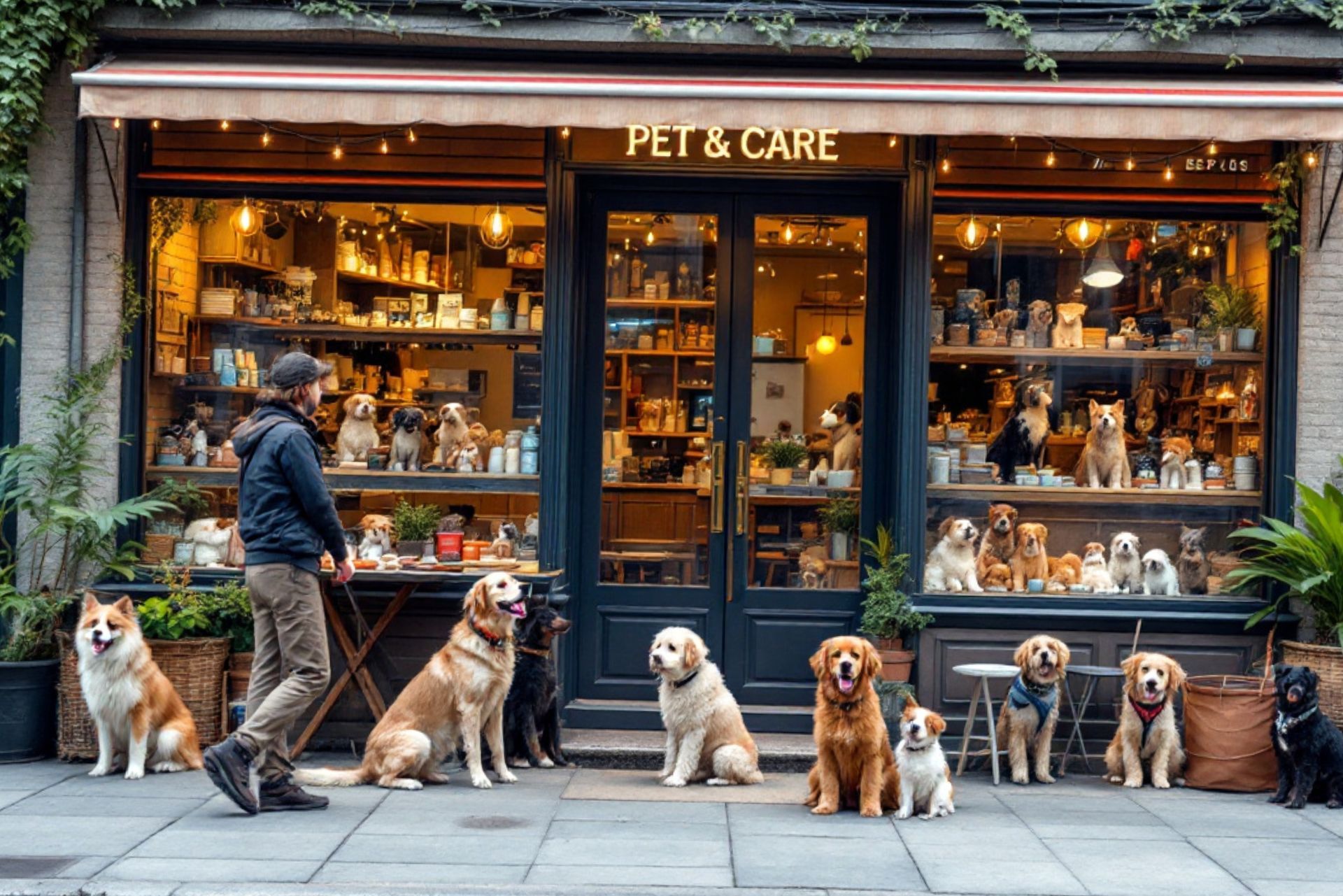
Most Common Business Policies
Index
Contact Us
Running a pet business in New York can be an incredibly rewarding venture, but it comes with its own set of risks. To protect both your business and your clients, pet business insurance is essential. Understanding its intricacies will help safeguard your investment and ensure peace of mind for you and your customers.
Understanding Pet Business Insurance
The Basics of Pet Business Insurance
Pet business insurance is designed to provide coverage against liabilities, property damage, and other unforeseen circumstances that can arise from running a pet-related business. This type of insurance varies significantly based on factors such as the nature of the business, the scale of operations, and specific services offered.
Common businesses requiring this insurance include pet grooming salons, boarding facilities, dog training services, and veterinary clinics. Each of these businesses faces unique risks, making tailored insurance policies vital for adequate protection. For instance, a grooming salon may need coverage for accidents that occur during a grooming session, while a boarding facility might require protection against illnesses that could spread among pets in their care. Understanding these nuances is crucial for business owners to ensure they are adequately covered.
Why Pet Business Insurance is Essential
Having pet business insurance is not just a legal requirement in many cases; it also provides critical financial protection. Should an incident occur, such as a client’s pet getting injured or damaged property, insurance can cover medical bills, legal fees, and other expenses associated with the incident. This financial safety net allows business owners to focus on providing quality care and services without the constant worry of potential liabilities that could threaten their livelihood.
Additionally, many clients will expect businesses handling their pets to have insurance. This coverage builds trust and credibility, enhancing your reputation in a competitive market. In an industry where the well-being of beloved pets is at stake, demonstrating that you have the necessary insurance can be a deciding factor for pet owners when choosing a service provider. Furthermore, having comprehensive insurance can also open doors to partnerships with other businesses, such as pet supply stores or veterinary clinics, as they may prefer to collaborate with insured entities to mitigate their own risks.

Types of Pet Business Insurance
General Liability Insurance
General liability insurance is fundamental for any pet business. It protects against a wide range of claims including bodily injury, property damage, and personal injury. For example, if a pet causes damage to a client's home during a grooming session, this insurance can cover the costs.
This type of coverage can also help protect against claims made by third parties. If someone falls in your facility due to negligence, general liability insurance will help cover medical expenses and legal fees. Moreover, this insurance can also extend to cover advertising injuries, such as if a competitor claims that your marketing materials are misleading or infringe on their intellectual property. Having this safety net allows pet business owners to focus on their passion for animals without the constant worry of potential lawsuits.
Professional Liability Insurance
Professional liability insurance, also known as errors and omissions insurance, is crucial for service-oriented pet businesses, such as training or grooming services. It protects against claims of negligence, miscommunication, or failure to deliver professional services as expected.
For instance, if a pet is harmed during grooming due to improper techniques, this insurance can cover the resultant legal claims tied to professional failure. Additionally, this coverage can be vital for businesses that offer specialized services, such as behavioral training or nutritional consulting, where the stakes are higher and the potential for client dissatisfaction can lead to claims. By having professional liability insurance, pet service providers can ensure they are prepared for any unexpected outcomes that may arise from their services, allowing them to maintain their reputation and client trust.
Property Insurance
Property insurance covers damage to the physical space where your business is located. This includes coverage for equipment, stock, and furniture. If a fire destroys your grooming station or if a storm damages your boarding facility, property insurance can help you recover costs for repairs or replacements.
It is important to ensure that your policy reflects the full value of your property to avoid underinsurance, which can leave you vulnerable in the event of a major claim. Furthermore, many property insurance policies can also include coverage for
business interruption, which compensates for lost income during the time your business is unable to operate due to covered damages. This added layer of protection can be crucial for maintaining financial stability, especially in the pet industry where consistent cash flow is essential for ongoing operations and employee salaries. By investing in comprehensive property insurance, pet business owners can safeguard their physical assets and ensure continuity in their services, even in the face of unforeseen disasters.
Costs Associated with Pet Business Insurance
Factors Influencing Insurance Costs
The cost of pet business insurance can vary widely based on several factors. These include the size of your business, the specific services you offer, your location, and the claims history of your business. High-risk businesses or those with a history of claims may face higher premiums.
Additionally, coverage limits and deductibles you choose will also influence costs. Opting for a lower deductible may increase your premium, while a higher deductible will reduce your premium but increase your out-of-pocket expenses in the event of a claim. It’s important to carefully assess your financial situation and risk tolerance when selecting these options, as they can significantly impact your overall budget.
Moreover, the type of pets you work with can also affect your insurance costs. For example, businesses that handle exotic animals may face higher premiums due to the increased risk associated with these pets. Similarly, if your business involves grooming or boarding, the potential for accidents or injuries can lead to increased insurance costs. Understanding these nuances can help you make informed decisions when it comes to your insurance policy.
Ways to Reduce Insurance Costs
There are several strategies to reduce your pet business insurance costs without sacrificing coverage. Bundling policies, for instance, can lead to significant discounts. Many providers offer package deals that combine general liability, property, and other types of coverage.
- Maintain a good credit score.
- Implement risk management practices to minimize claims.
- Regularly review and adjust your coverage needs.
- Shop around and compare insurance quotes from different providers.
Regularly revisiting your policy as your business grows or changes is essential to ensure you maintain adequate but cost-effective coverage. Additionally, investing in training for your staff can also help mitigate risks, as well-trained employees are less likely to make mistakes that could lead to claims. Consider offering ongoing education on safety protocols and emergency procedures to further enhance your risk management strategy.
Another effective way to lower your insurance costs is to participate in industry associations or groups that provide resources and support for pet businesses. Many of these organizations offer access to group insurance plans, which can provide more favorable rates than individual policies. Furthermore, being part of a community can also keep you informed about best practices and emerging trends in the pet care industry, ultimately leading to a more successful and secure business.
The Process of Getting Pet Business Insurance in New York
Steps to Apply for Pet Business Insurance
The process of obtaining pet business insurance in New York can be straightforward if approached methodically. Firstly, evaluate your business’s specific risks and determine the types of coverage you need. This self-assessment will be pivotal in finding the right insurance. Consider factors such as the types of pets you work with, the services you provide, and the potential liabilities associated with your operations. For instance, if you run a dog grooming service, you may want to look into coverage that protects against injuries that could occur during grooming sessions, as well as any property damage that might arise.
Next, research various insurance providers to find those specializing in pet business insurance. Request quotes and ask detailed questions about what each policy covers. Comparing rates and policy features can help you make an informed decision. Additionally, it may be beneficial to read customer reviews and seek recommendations from fellow pet business owners. This can give you insights into the reliability of the insurance provider and the quality of their customer service, which is crucial when you need assistance or have to file a claim.
Documents Required for Insurance Application
When applying for pet business insurance, be prepared to provide a variety of documents, including:
- Your business license and registration
- Financial statements
- A detailed description of services offered
- Contracts or agreements with clients
- Your claims history, if applicable
Having these documents ready will streamline the application process and help insurance agents better understand your needs. Additionally, it’s wise to include any certifications or training your staff has completed, as this can demonstrate your commitment to professionalism and safety in your operations. For example, if your team has undergone first aid training for pets or has certifications in animal behavior, these credentials can enhance your application and potentially lower your premiums.
Moreover, be prepared to discuss your business’s operational procedures. Insurers often look favorably on businesses that have established safety protocols and risk management strategies. This might include how you handle pet interactions, your emergency response plans, and your policies for client communication. By showcasing your proactive approach to managing risks, you can instill confidence in the insurer about your business practices and potentially secure better coverage options.
Legal Requirements for Pet Business Insurance in New York
State Regulations for Pet Business Insurance
In New York, while there is no specific law mandating pet businesses to carry insurance, certain types of businesses may require specific coverage, particularly those that handle animals in a professional capacity.
For example, veterinary clinics and grooming salons might be subject to stricter regulations, often necessitating liability insurance to protect against potential claims. Familiarizing yourself with both state and local legal requirements is crucial as this will guide you in meeting necessary coverage standards. Additionally, pet boarding facilities and doggy daycare centers may also face unique insurance needs, as they have a higher risk of incidents occurring due to the nature of their services. Understanding these nuances can help you select the right policy tailored to your specific business operations.
Consequences of Not Having Pet Business Insurance
Not having pet business insurance can have serious ramifications. In the event of a lawsuit or accident, you may be responsible for covering all costs, which can quickly accumulate to tens of thousands of dollars.
Furthermore, lacking insurance can damage your reputation within the community. Clients may be hesitant to trust a business that does not have coverage, leading to lost income and potential business failure. In addition to financial repercussions, the absence of insurance can also limit your ability to secure contracts with other businesses or organizations that require proof of coverage. Many pet-related events, such as dog shows or pet expos, may also require vendors to have insurance, making it essential for your business to be adequately protected to participate in these opportunities and grow your client base.

Frequently Asked Questions about Pet Business Insurance
What Does Pet Business Insurance Cover?
Pet business insurance typically covers a range of incidents, including:
- Bodily injury or property damage caused while performing your services
- Legal defense costs against claims
- Damage to your business property
- Medical payments for injuries sustained by pets in your care
However, the specifics can vary by policy, so reviewing the details and exclusions of your coverage is vital. Additionally, many policies can be tailored to include coverage for specific services you provide, such as grooming, boarding, or training. For instance, if you operate a pet daycare, you might want to consider coverage for incidents that occur during playtime or while pets are being transported. Some providers also offer optional add-ons like coverage for lost or stolen pets, which can be particularly beneficial for businesses that involve pet sitting or walking.
Is Pet Business Insurance Mandatory in New York?
While pet business insurance is not universally mandated in New York, it is highly recommended. Depending on the type of business you operate, having certain forms of coverage may be required by local regulations or as part of contracts with clients. For example, dog walkers and pet sitters may find that clients require proof of insurance before entrusting their pets to their care. Moreover, having insurance can enhance your credibility and professionalism, making you more appealing to potential clients who want assurance that their beloved pets are in safe hands.
In summary, understanding and obtaining pet business insurance is an important step in safeguarding your New York pet business. Awareness of the types of coverage, costs, regulations, and application processes will ensure you are well-prepared to handle both opportunities and challenges in the pet care industry. Furthermore, investing in comprehensive insurance not only protects your business assets but also fosters trust with your clients, allowing you to build long-lasting relationships in a competitive market. As the pet care industry continues to grow, being adequately insured can set you apart from others who may overlook this crucial aspect of business management.
